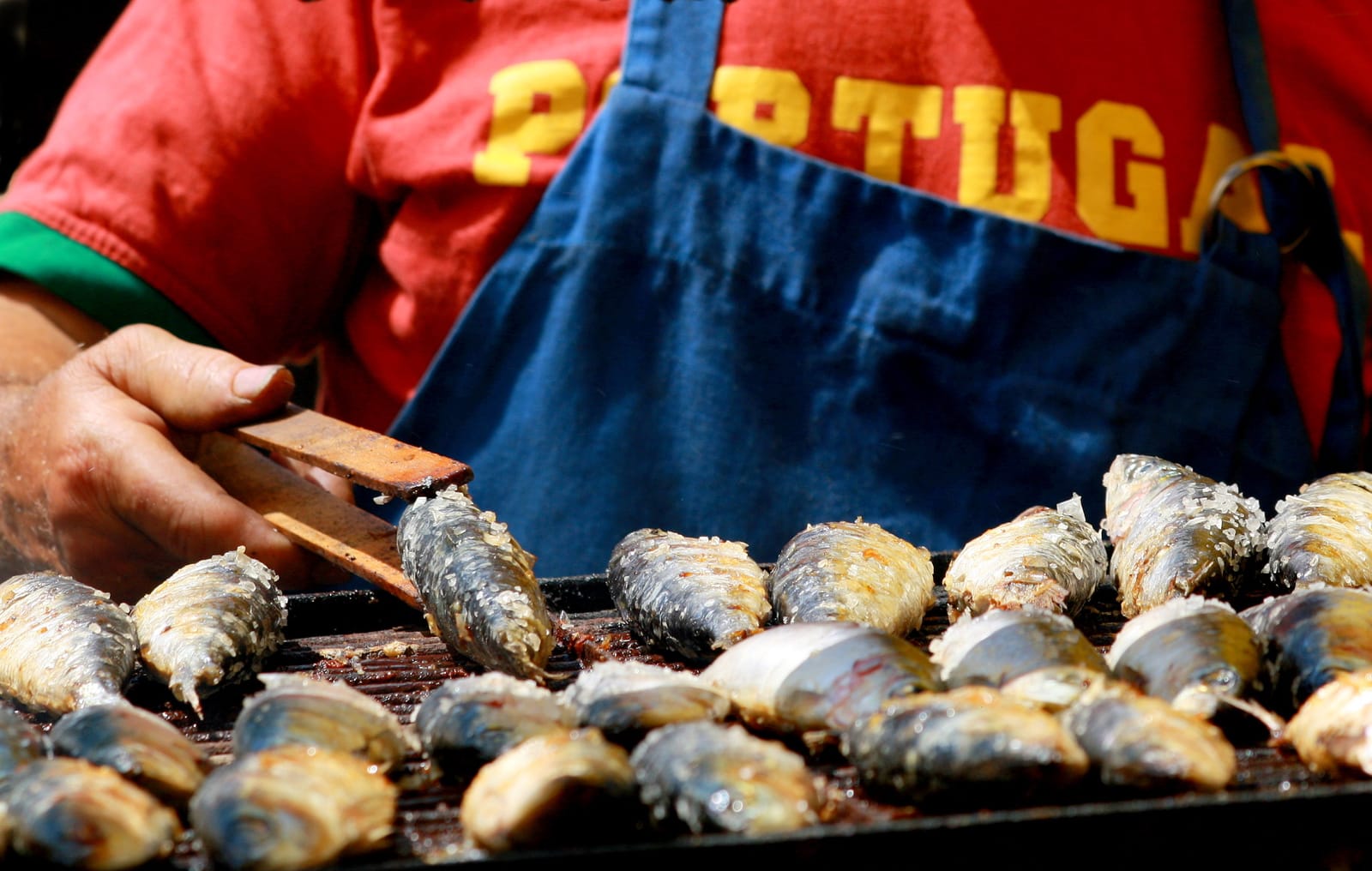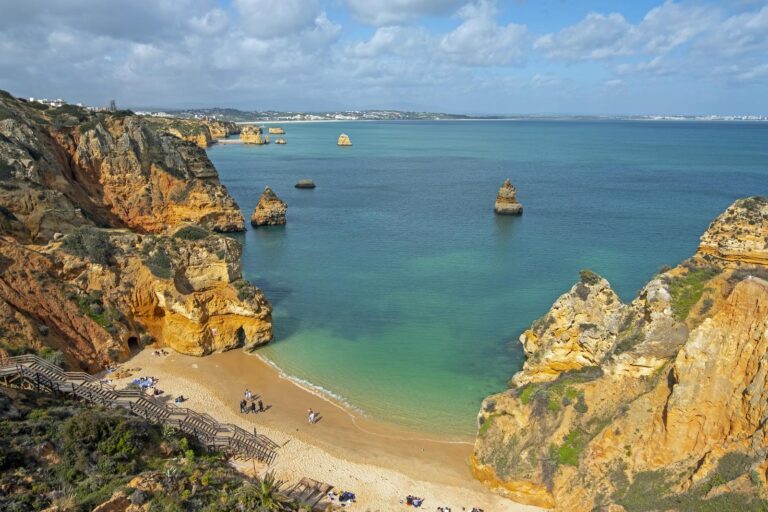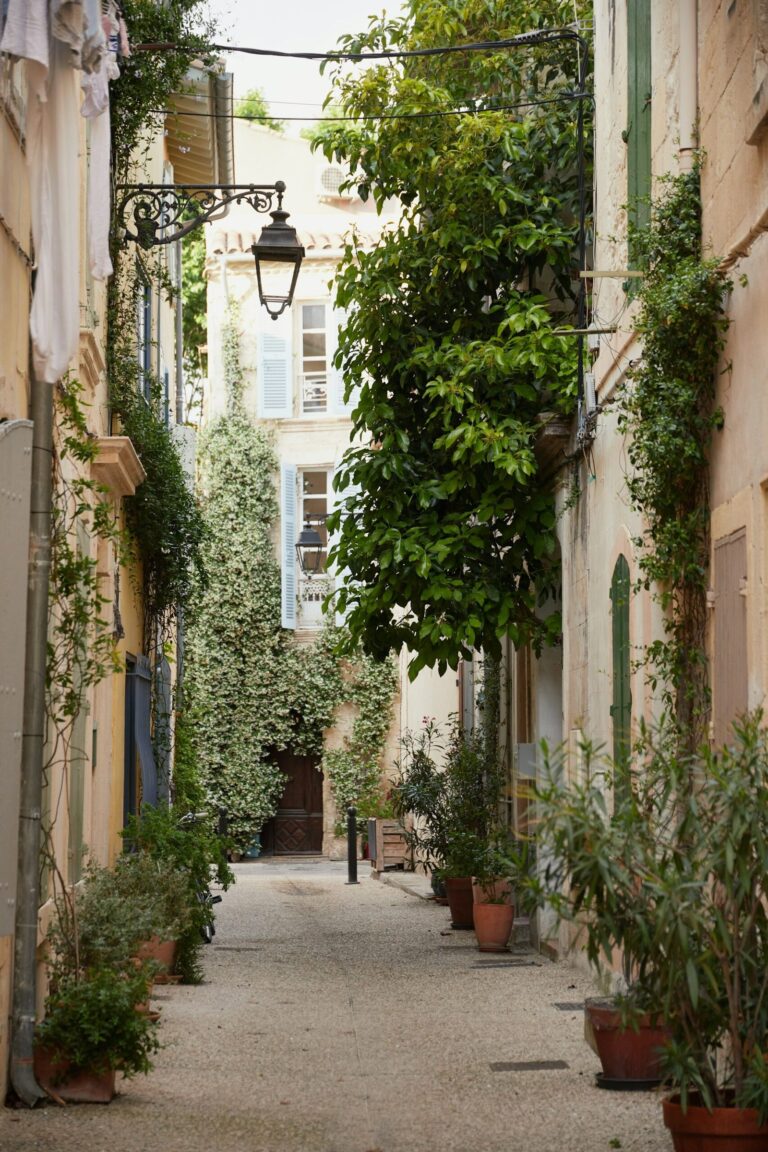Lisbon Food Tours: Discover the Best Flavors of the City
Experiencing the vibrant culinary scene in Lisbon is a must for any food lover.
With its mix of traditional recipes and modern twists, the city offers a feast for the senses that you won’t want to miss.
Lisbon food tours provide the perfect opportunity to explore local flavors and discover hidden gems that you might not find on your own.
As you wander through charming streets, each food tour immerses you in the local culture while guiding you through delicious tastings.
From savory pastries to exquisite seafood dishes, you’ll get a taste of the authentic Lisbon that locals cherish.
Joining a food tour allows you to engage with knowledgeable guides who share stories about the city’s rich culinary heritage, making your experience even more meaningful.
Whether you’re a seasoned foodie or just starting your culinary journey, there’s something for everyone on these tours.
You’ll not only satisfy your appetite but also gain insights into the traditions and ingredients that shape Portuguese cuisine.
So grab your appetite and get ready to explore Lisbon’s food scene like a true local!
The Essence of Lisbon’s Gastronomy
Lisbon’s gastronomy is a vibrant tapestry woven from local ingredients, rich culinary history, and iconic dishes. Each bite reflects the city’s culture and traditions, offering a unique taste experience.
Local Delicacies
When in Lisbon, you must try the pastéis de nata, a custard tart that perfectly embodies Portuguese pastry-making.
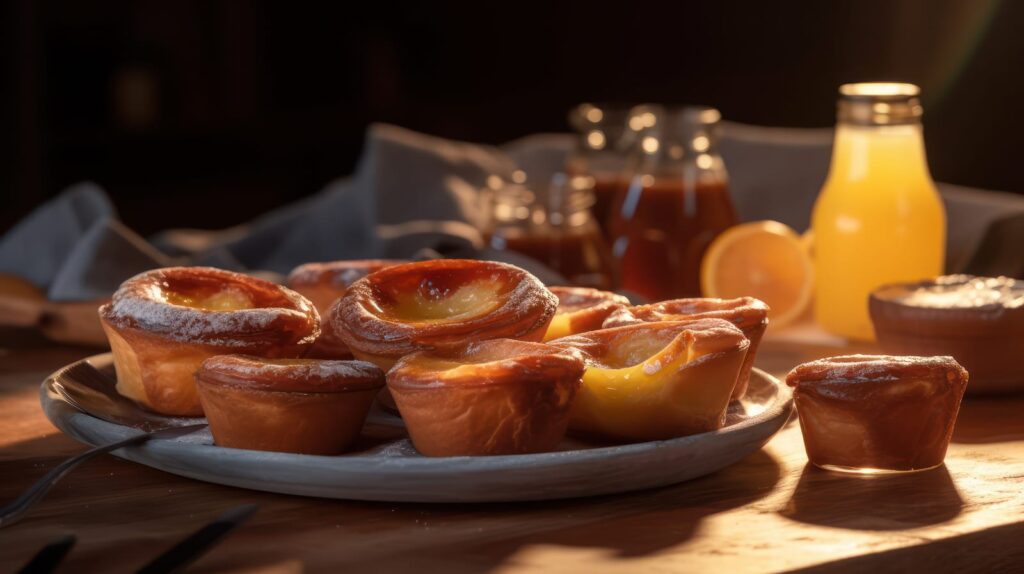
These delectable treats have a crispy crust filled with a creamy egg custard, often topped with a sprinkle of cinnamon or powdered sugar.
Another must-try is bacalhau à brás, a dish made from salted cod, onions, and straw fries, bound together with beaten eggs. It’s a flavorful representation of Portugal’s love for bacalhau, or cod, which is a national obsession.
Don’t forget to sample the sardinhas assadas (grilled sardines), especially during the Santo António festival. These flavorful fish are typically served with bread and a drizzle of olive oil, making for a simple yet delightful snack.
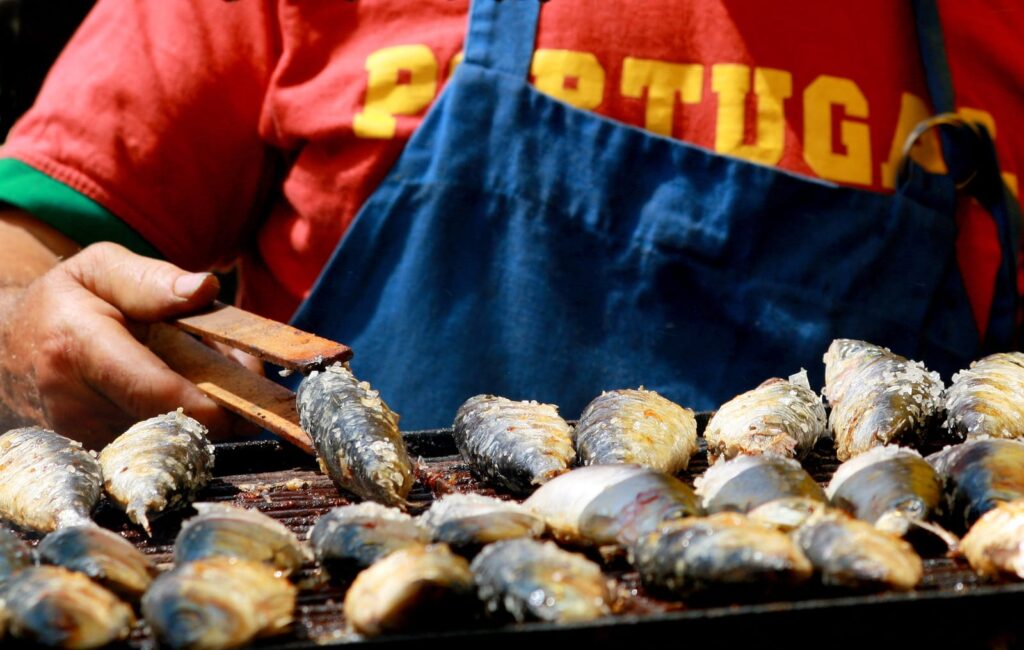
Culinary History
Lisbon’s gastronomy draws heavily from its seafaring history. The Age of Discoveries introduced a multitude of spices and ingredients from around the world, influencing local cuisine.
With influences from Moorish, African, and even Asian cuisines, dishes in Lisbon often combine flavors in unexpected ways. The use of saffron, garlic, and olive oil showcases this blend beautifully.
The tradition of preserving fish, particularly bacalhau, speaks to the historical necessity of food preservation methods before refrigeration became common. This has shaped the local dietary habits and keeps culinary traditions alive today.
Popular Ingredients
Key ingredients in Lisbon’s cuisine include olive oil, fresh seafood, and local vegetables. Olive oil is a staple, adding flavor and health benefits to many dishes.
Seafood, especially fish like sardines and octopus, plays a central role. These ingredients find their way into traditional dishes, offering fresh and authentic flavors.
You might also encounter pulses and root vegetables such as chickpeas and potatoes, commonly seen in hearty stews. Herbs like parsley and coriander are frequently used to enhance taste and freshness.
Together, these ingredients create a food culture that’s both comforting and deeply tied to the land and sea of Portugal.
Types of Food Tours
In Lisbon, you have a variety of food tours to choose from, each offering unique culinary experiences. From vibrant markets to gourmet dining, there’s something to satisfy every palate.
Market and Street Food Tours
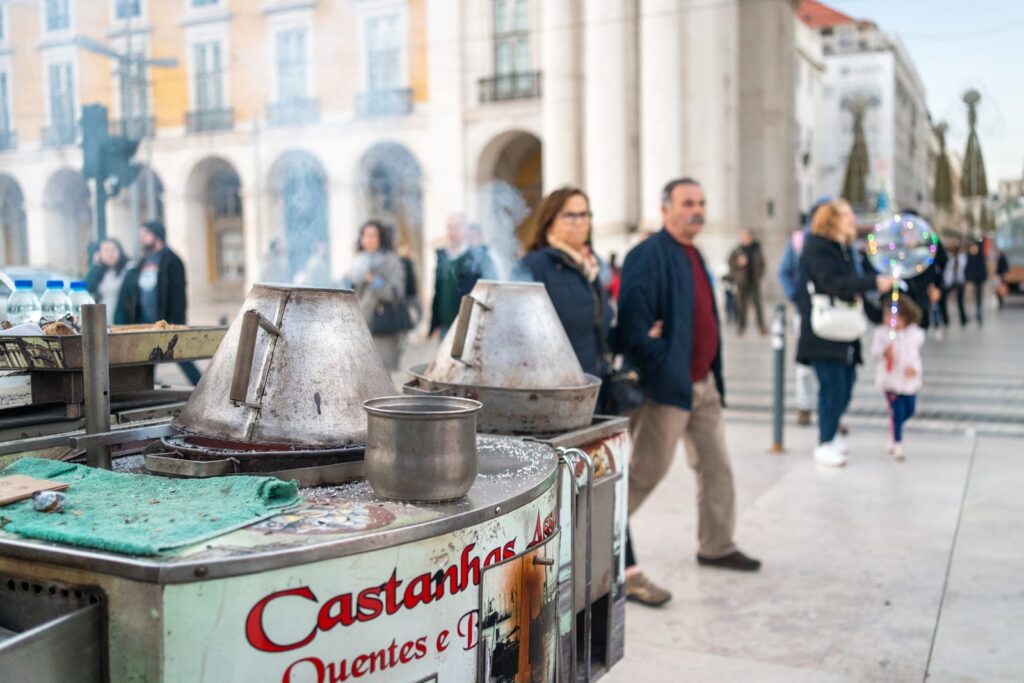
Market and street food tours provide an authentic taste of Lisbon’s vibrant culinary scene.
You’ll explore local markets like Mercado da Ribeira, sampling fresh produce, meats, and baked goods.
Street food vendors offer mouthwatering bites such as pastéis de nata and bifanas—a pork sandwich that’s a local favorite. You will also find delicious roasted chestnuts everywhere.
Guides often share stories behind the food, making it a cultural journey as well. These tours not only fill your stomach but also give you a glimpse into the everyday life of Lisboetas.
Gourmet and Fine Dining Experiences
For those seeking a more refined culinary experience, gourmet and fine dining tours showcase Lisbon’s upscale restaurants.
You might visit places known for their innovative takes on traditional Portuguese dishes.
These tours often include multiple courses, featuring meticulously prepared dishes paired with local wines.
Expect elegant settings and knowledgeable guides who can explain the ingredients and techniques involved.
Dining at establishments with notable chefs can provide memorable gastronomic delights that highlight Portugal’s rich culinary heritage.
Seafood Sensations
Lisbon, being a coastal city, is famous for its seafood. Seafood-focused tours often take you to popular restaurants and hidden gems along the waterfront.
You can savor fresh catches such as bacalhau (cod), sardines, and octopus, prepared in various traditional styles.
Guides usually share tips on best preparation methods and the importance of seafood in Portuguese culture. This immersive experience ensures you appreciate the local flavors while enjoying stunning views of the Tagus River.
Hidden Gems and Local Favorites
Exploring hidden gems and local favorites is a fantastic way to experience authentic Lisbon cuisine. These tours often focus on family-owned eateries that tourists may overlook.
You might discover dishes like caldo verde (green soup) or francesinha (a rich sandwich).
Your guide will introduce you to passionate cooks and owners who share their recipes and stories. This personal touch makes your food journey more meaningful and delicious.
Vegetarian and Vegan Options
Vegetarian and vegan food tours in Lisbon are growing in popularity, catering to diverse dietary preferences.
You can explore restaurants that specialize in plant-based dishes, showcasing the creativity of Portuguese chefs.
Expect to taste flavorful dishes made from fresh, local ingredients. Options may include innovative salads, hearty stews, and delicious desserts.
Your guide can suggest local markets where you can find seasonal produce, allowing you to appreciate Lisbon’s culinary diversity beyond traditional meat-focused dishes.
Planning Your Food Tour
When planning your food tour in Lisbon, it’s essential to consider the best time to visit, how long the tour will last, and the ideal group size. Each of these factors will shape your experience and help you choose the perfect culinary adventure.
Best Time to Go
The best time to explore Lisbon’s food scene is during the spring (March to June) and fall (September to November).
These seasons offer pleasant weather, making it enjoyable to walk around the city while tasting local dishes.
During these months, many food tours operate frequently, allowing for a variety of options. Summer can be hot and crowded, making it harder to enjoy your time fully.
Rainy winter months can also limit outdoor experiences. So, aim for those shoulder seasons for a more comfortable experience.
Duration and Timing
Most food tours in Lisbon range from 2.5 to 4 hours, which provides ample time to taste a variety of dishes without feeling rushed.
Shorter tours are great for quick bites, while longer ones usually include more comprehensive experiences with multiple stops.
Consider the timing of your tour. Many tours take place during lunch or early evening, allowing you to combine dining with sightseeing.
Book early to secure your preferred time, especially during peak tourist season.
Group Size Considerations
Group size can significantly affect your food tour experience.
Smaller groups, ideally 6-10 people, allow for a more intimate setting and personalized attention from guides. This setup lets you engage more directly with local cuisines and the stories behind them.
Larger groups may offer a lively atmosphere but can feel less personal. If you prefer a quieter, more focused experience, look for tours that limit the number of participants.
Check reviews to see which tours have a good track record in this area before making a reservation.
Tasting Lisbon’s Neighborhoods
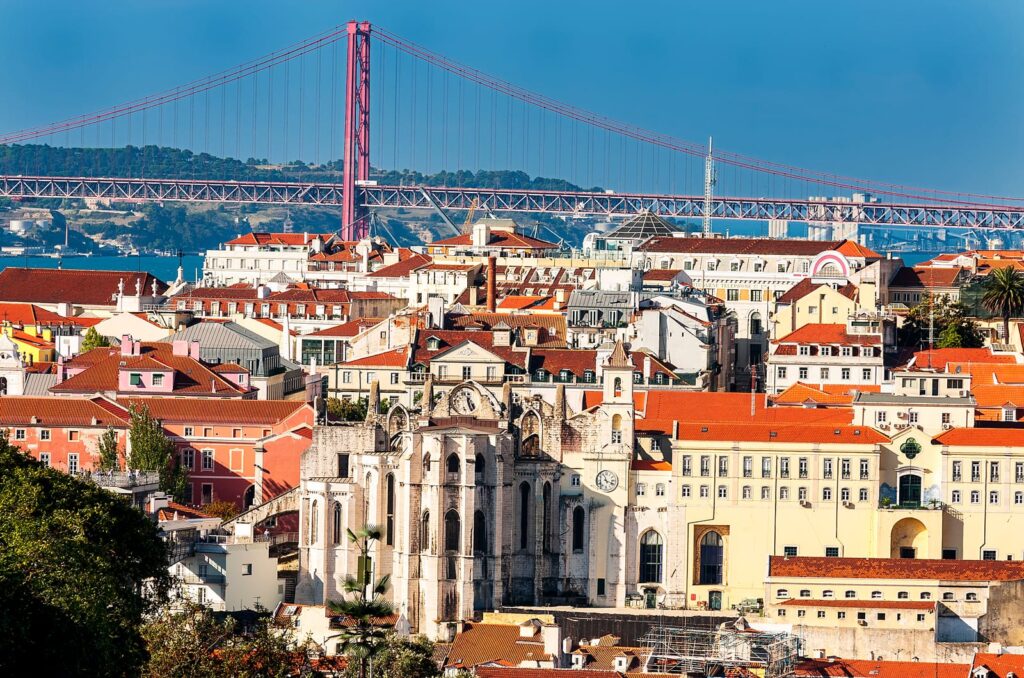
Exploring Lisbon’s vibrant neighborhoods through food is an unforgettable experience. Each area offers unique flavors and culinary traditions that reflect the city’s rich history and culture.
Bairro Alto and Chiado
Bairro Alto is famous for its lively nightlife and eclectic mix of bars and restaurants. Here, you can savor local wines and traditional petiscos, which are similar to tapas.
As you wander through the narrow, cobblestone streets, look for cozy eateries that serve grilled octopus or expertly made bacalhau (salt cod).
Chiado, which is adjacent to Bairro Alto, blends culture with gastronomy. You’ll find elegant cafés and bakeries where you can enjoy a pastel de nata, a beloved Portuguese custard tart.
Visiting both neighborhoods gives you a taste of Lisbon’s contemporary and historic culinary scene.
Alfama District
Alfama is one of Lisbon’s oldest neighborhoods, known for its narrow streets and traditional charm. A food tour here often includes stops at local markets, where you can sample fresh ingredients that define Portuguese cuisine.
Try specialties like chouriço (smoked sausage) and local cheeses.
Enjoying a meal while overlooking the Tagus River enhances the experience. Keep your eyes peeled for fado houses, where the haunting music pairs perfectly with the rich flavors of the food.
Belém and the Pastéis de Belém
Belém is a must-visit for any food lover, particularly known for its iconic pastéis de Belém. These pastries are a UNESCO-recognized delight that originated from the nearby Jerónimos Monastery.
When in Belém, don’t miss the chance to taste these creamy custard tarts, best enjoyed warm and dusted with cinnamon and powdered sugar.
Accompanying a pastel with a cup of strong Portuguese coffee creates the perfect afternoon treat. Beyond sweets, the area is rich in history, making it a perfect blend of cultural exploration and culinary enjoyment.
Cultural Immersion
Experiencing Lisbon’s culinary scene goes beyond tasting local dishes. Engaging in hands-on activities allows you to connect with the culture through food. From cooking classes to visits with local producers, these experiences enrich your understanding of Portuguese gastronomy.
Cooking Classes and Workshops
Joining a cooking class is a fantastic way to immerse yourself in Portuguese cuisine.
You’ll learn about traditional dishes, like bacalhau à brás, while working alongside local chefs.
Many classes offer market visits where you can select fresh ingredients. Activities often include step-by-step instructions, allowing you to recreate the dishes at home.
Furthermore, sharing a meal you’ve prepared with fellow participants fosters connections. A cooking workshop turns a meal into a shared experience. It’s not just about cooking; it’s about culture and community.
Food and Wine Pairing
Participating in food and wine pairing sessions introduces you to the nuances of Portuguese flavors.
Experts guide you through selecting the right wines to complement traditional dishes.
You’ll taste local wines such as Vinho Verde or Port, learning about their production and characteristics.
Pairing wine with food enhances the flavors of both. You might find yourself enjoying a rich seafood dish with a crisp white wine. The experience is educational and satisfying, providing insights that elevate your culinary adventures.
Visits to Local Producers
Visiting local producers offers a closer look at the origins of your favorite ingredients.
You might tour a cheese factory, olive oil mill, or winery, witnessing the passion behind each product.
These visits often include tastings, allowing you to savor fresh, high-quality products. Learning about traditional production techniques can deepen your appreciation for what you eat.
Engaging directly with producers allows for personal stories and cultural exchanges. You’ll leave with a broader understanding of the local food landscape and its significance to Lisbon’s heritage.
Beyond the Bite: Experiences
When exploring Lisbon’s food scene, the experiences extend far beyond just tasting local dishes. The city offers a rich blend of culture, history, and scenic beauty that enhances your culinary adventures.
Live Fado Performances
As you savor Portuguese cuisine, immerse yourself in the soulful sounds of Fado.
This traditional musical genre, characterized by its expressive and melancholic tunes, often accompanies dinner in local restaurants.
Many eateries in districts like Alfama and Bairro Alto combine dining with live performances.
Enjoy dishes like bacalhau à brás while talented musicians bring the atmosphere to life. Not only do you get to taste authentic flavors, but you also witness a cultural performance that connects deeply with the local heritage.
Historical Tours
Discover Lisbon’s gastronomic heritage through historical food tours.
These guided experiences take you through the city’s significant neighborhoods, offering insights into its culinary evolution.
For instance, tours in neighborhoods like Mouraria or Alfama highlight centuries-old eateries and local specialties. You’ll learn how dishes like pastéis de nata originated and evolved.
Engaging with local chefs and residents, you can appreciate the stories behind every bite, making your food experience richer and more meaningful.
Sunset River Cruises with Dining
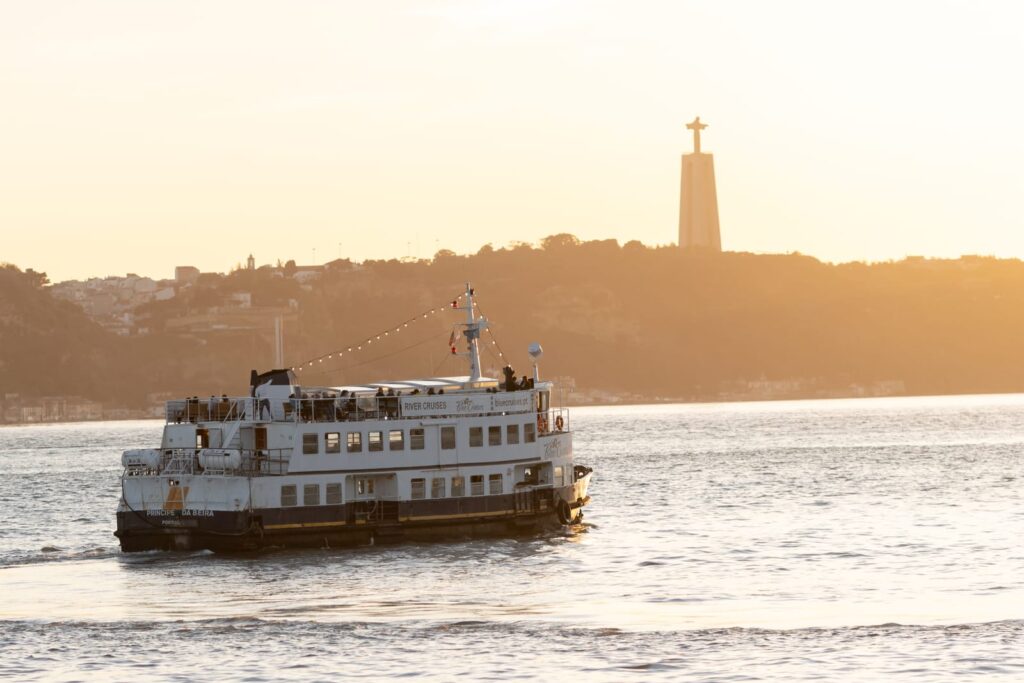
Enjoy the stunning skyline while dining on a sunset river cruise.
These enchanting experiences allow you to relax as you float along the Tagus River, taking in the breathtaking views of landmarks like the Belém Tower.
Many cruises include traditional Portuguese menus, featuring fresh seafood and regional wines.
As the sun dips below the horizon, you’ll not only indulge in incredible food but also create lasting memories against the backdrop of Lisbon’s picturesque landscape. It’s a unique way to blend dining with a visual feast.
Sustainable and Responsible Tourism
Sustainable tourism in Lisbon focuses on minimizing environmental impact while enriching local communities. By participating in food tours, you can support local businesses and enjoy fresh, seasonal ingredients that reflect the region’s culinary heritage.
Supporting Local Businesses
When you explore Lisbon’s food scene, you contribute directly to small, local businesses.
Many food tours incorporate visits to family-owned restaurants and artisan producers. This approach ensures that your money supports the community rather than large chains.
Look for tours that emphasize partnerships with local chefs and markets. These connections often lead to unique experiences, such as tasting dishes prepared using traditional methods.
By choosing these options, you help preserve the city’s culinary culture and promote economic development.
Seasonal and Organic Wares
One of the joys of participating in food tours is discovering seasonal and organic produce.
Many local chefs prioritize ingredients grown sustainably, ensuring freshness and flavor in their dishes.
On your journey, you might sample ingredients from local farmers or visit markets that specialize in organic products. Engaging with these practices not only enhances your culinary experience but also supports eco-friendly farming methods.
By savoring locally sourced meals, you’re participating in a movement that values quality over quantity. This choice fosters a deeper connection to the land and the people, as well as a more enriching travel experience.
Practical Tips
To make the most of your Lisbon food tour experience, consider a few practical tips that can enhance your enjoyment.
From planning ahead to considering your comfort during the tour, these insights will help you navigate your culinary adventure effectively.
Booking in Advance
It’s wise to book your food tour in advance.
Popular tours can fill up quickly, especially during the peak tourist season. Check reviews and ratings to select the best options for your tastes.
Many tours offer limited spaces, which means early reservations can guarantee your preferred date and time.
Some tours allow for flexible cancellation policies, giving you peace of mind in case your plans change.
Look for reputable websites or platforms where you can compare tours. It’s often helpful to read the itinerary to ensure it aligns with your interests.
Dietary Restrictions
If you have dietary restrictions, communicate them when booking your tour.
Many Lisbon food tours can accommodate various needs, including vegetarian, vegan, gluten-free, or dairy-free diets. Don’t hesitate to ask questions about the menu options.
When you arrive at the tour, remind your guide of your restrictions to ensure a safe experience. This communication allows the tour operators to prepare special dishes or suggest suitable alternatives.
Comfortable Attire
Wearing comfortable clothing is essential for enjoying your food tour.
You’ll likely be walking through different neighborhoods, which may include uneven streets and steps.
Opt for breathable fabrics and good shoes to keep you at ease.
Consider the weather when choosing your outfit. Layering can be a smart choice, especially in Lisbon’s changing temperatures.
A light jacket may be useful for cooler evenings.
Don’t forget accessories like sunglasses or hats for sunny days to enhance your enjoyment as you explore the city’s vibrant culinary scene.

